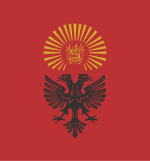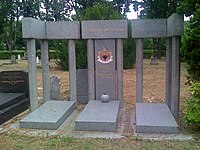Zog I
Born to a beylik family in Ottoman Albania, Zogolli was active in Albanian politics from a young age and fought on the side of Austria-Hungary during the First World War.He held various ministerial posts in the Albanian government before being driven into exile in June 1924, but returned later in the year with Yugoslav and White Russian military support and was subsequently elected prime minister.Zogu was elected president in January 1925 and vested with dictatorial powers, with which he enacted major domestic reforms, suppressed civil liberties, and struck an alliance with Benito Mussolini's Fascist Italy.[6] Zogu's government followed the European model, though large parts of Albania still maintained a social structure unchanged from the days of Ottoman rule, and most villages were serf plantations run by the Beys.His principal ally during this period was the Kingdom of Italy, which lent his government funds in exchange for a greater role in Albania's fiscal policy.He proclaimed a constitutional monarchy similar to the contemporary regime in Italy, created a strong police force, and instituted the Zogist salute (flat hand over the heart with palm facing downwards).One of his sisters, Senije (c. 1897 – 1969), married Shehzade Mehmed Abid Efendi, another Ottoman prince and son of Sultan Abdul Hamid II.In 1929, King Zog abolished Islamic law in Albania, adopting in its place a civil code based on the Swiss one, as Mustafa Kemal Atatürk had done in Turkey in the same decade.[6] In 1938, as a result of a request from his advisor and friend Constantino Spanchis, Zog opened the borders of Albania to Jewish refugees fleeing persecution in Nazi Germany.Nonetheless, he did have strong connections with Muslim royal families in the Arab World, particularly Egypt, whose ruling dynasty had Albanian origins.As king, he was honoured by the governments of Italy, Luxembourg, Egypt, Yugoslavia, France, Romania, Greece, Belgium, Bulgaria, Hungary, Poland, Czechoslovakia, and Austria.[12] In April 1938, Zog married Countess Geraldine Apponyi de Nagy-Appony, a Roman Catholic aristocrat who was half-Hungarian and half-American.Valteri, a member of the revolutionary Bashkimi ("The union") committee led by Avni Rustemi,[20] was set free by the Court of Tirana after declaring that it was an individual act.[14] The Austrian authorities arrested Çami, Gjeloshi, and later Qazim Mulleti, Rexhep Mitrovica, Menduh Angoni, Angjelin Suma, Luigj Shkurti, Sejfi Vllamasi, etc.[26] Two days after the birth of Zog's son and heir apparent, on 7 April 1939 (Good Friday), Mussolini's Italy invaded, facing no significant resistance.The royal family, realising that their lives were in danger, fled into exile, taking with them a considerable amount of gold from the National Bank of Tirana and Durrës.[31] After a short stay in Greece, the Zog party went to Istanbul in Turkey, then fled through Romania, Poland, Latvia, Sweden, Norway, Belgium to Paris.He made his final home in France, where he died at the Foch Hospital, Suresnes, Hauts-de-Seine on 9 April 1961, aged 65, of an undisclosed condition.[citation needed] Zog was said to have regularly smoked 200 cigarettes a day, giving him a possible claim to the title of the world's heaviest smoker in 1929,[35] but had been seriously ill for some time.[37] Sponsored by MI6 and the CIA, some forces loyal to Zog attempted to mount infiltrations into the country, but most were ambushed due to intelligence sent to the Soviet Union by spy Kim Philby.Leka, believing the result to be fraudulent, attempted an armed uprising: he was unsuccessful and was forced into exile, although he later returned and lived in Tirana until his death on 30 November 2011.This segment, entitled 'Un ballo in maschera' after the Giuseppe Verdi opera, was directed by Nicolas Roeg, with actor Theresa Russell playing King Zog during a fictionalized account of his visit to Vienna in 1931 and the assassination attempt on the steps of that city's opera house (as noted earlier, Zog had actually seen a performance of 'Pagliacci' before the real attack).In the "new" Doc Savage pulp fiction novel, The Whistling Wraith (July 1993, Bantam/Spectra), from the original notes of Lester Dent (primary writer of the sagas) but now completed as a novel by Will Murray, the life & person of Zog, as well as Albania's political problems and foreign policy issues with Mussolini's Italy are key to the plot.[45] In episode 13 of Monty Python's Flying Circus he is mentioned as a reporter for made-up news show called ProbeAround but suddenly dies.















King of the AlbaniansVictor Emmanuel IIIPresident of AlbaniaVilhelm IPrime Minister of AlbaniaXhafer bej YpiShefqet VërlaciIlias VrioniKoço KotaBurgajet CastleBurrelOttoman EmpireSuresnesCimetière parisien de ThiaisMausoleum of the Albanian Royal FamilyGéraldine Apponyi de NagyapponyLeka, Crown Prince of AlbaniaXhemal Pasha ZogolliSadije ToptaniSunni IslamFamilyPresidentKing of AlbaniaKingdomRoyal Albanian ArmyZogist saluteFrangaTreaties of TiranaBank of AlbaniaItalian invasionLegality MovementZogu I BoulevardKing Zog (statue)AlbaniaPrime MinisterbeylikOttoman AlbaniaAustria-HungaryFirst World WarAlbanian governmentYugoslavWhite Russiancivil libertiesBenito MussoliniFascist ItalyGeraldine Apponyi de Nagy-Apponyinvaded AlbaniaItalian protectorateSecond World Waranti-monarchist governmentEnver HoxhaThiais Cemeteryroyal mausoleumTiranalandownersXhelal Pasha ZogolliToptani familySkanderbegGalatasaray High SchoolFrenchBeyoğluXhelal Bey ZogolliAlbanian Declaration of IndependenceViennaShkodërLuigj GurakuqiFan S. NoliParliamentAvni Rustemileftist revoltPyotr WrangelSergei UlagaySveti NaumYugoslaviaPeshkëpi (Pëshkupat)Kingdom of ItalyKosovo AlbanianHasan PrishtinaBajram CurriAlbaniansMehmed Orhan EfendiprincePrince WiedField Marshalconstitutional monarchypaper currencySenijeShehzade Mehmed Abid EfendiAbdul Hamid IIKing of the BelgiansMuslimIslamic lawcivil codeMustafa Kemal Atatürkhad doneTurkeyJewishNazi GermanyZogian gold hundred-franc coin100-francaristocratroyal familiesArab Worldruling dynastyLuxembourgFranceRomaniaGreeceBelgiumBulgariaHungaryPolandCzechoslovakiaAustriaShefqet Bey VerlaciCountessRoman CatholicHungarianAmericanCrown Prince Lekablood feudsBeqir ValteriEkrem VloraQazim KoculiAli KlissuraVienna State Opera